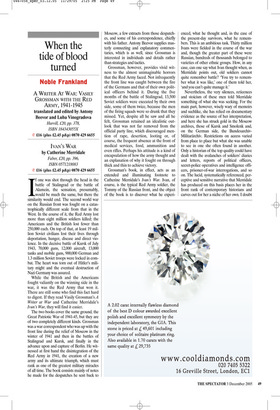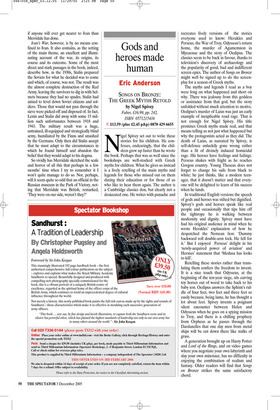When the tide of blood turned
Noble Frankland
A WRITER AT WAR: VASILY GROSSMAN WITH THE RED ARMY, 1941-1945 translated and edited by Antony Beevor and Luba Vinogradova Harvill, £20, pp. 378, ISBN 184343055X ✆ £16 (plus £2.45 p&p) 0870 429 6655 IVAN’S WAR by Catherine Merridale Faber, £20, pp. 396, ISBN 0571218083 ✆ £16 (plus £2.45 p&p) 0870 429 6655 If one was shot through the head in the battle of Stalingrad or the battle of Alamein, the sensation, presumably, would be much the same, but there the similarity would end. The second world war on the Russian front was fought on a catastrophically different scale from that in the West. In the course of it, the Red Army lost more than eight million soldiers killed; the Americans and the British lost fewer than 250,000 each. On top of that, at least 19 million Soviet civilians lost their lives through deportation, hunger, disease and direct violence. In the decisive battle of Kursk of July 1943, 70,000 guns, 12,000 aircraft, 13,000 tanks and mobile guns, 900,000 German and 1.3 million Soviet troops were locked in combat. The heart was torn out of Hitler’s military might and the eventual destruction of Nazi Germany was assured.
While the British and the Americans fought valiantly on the winning side in the war, it was the Red Army that won it. There are still some who find this fact hard to digest. If they read Vasily Grossman’s A Writer at War and Catherine Merridale’s Ivan’s War, they will find it easier.
The two books cover the same ground, the Great Patriotic War of 1941-45, but they are of two completely different kinds. Grossman was a war correspondent who was up with the front line during the relief of Moscow in the winter of 1941 and then in the battles of Stalingrad and Kursk, and finally in the advance upon and capture of Berlin. He witnessed at first hand the disintegration of the Red Army in 1941, the creation of a new army and its ultimate triumph, which must rank as one of the greatest military miracles of all time. The book consists mainly of notes he made for the despatches he sent back to Moscow, a few extracts from those despatches, and some of his correspondence, chiefly with his father. Antony Beevor supplies masterly connecting and explanatory commentaries, which is as well, since Grossman is interested in individuals and details rather than strategies and tactics.
Grossman, however, provides vivid witness to the almost unimaginable horrors that the Red Army faced. Not infrequently the front line was caught between the fire of the Germans and that of their own political officers behind it. During the five months of the battle of Stalingrad, 13,500 Soviet soldiers were executed by their own side, some of them twice, because the men of the firing squads were so drunk that they missed. Yet, despite all he saw and all he felt, Grossman retained an idealistic outlook that was not far removed from the official party line, which discouraged mention of rape, desertion, looting or, of course, the frequent absence at the front of medical services, food, ammunition and even rifles. Perhaps his attitude is a kind of encapsulation of how the army thought and an explanation of why it fought on through thick and thin to achieve victory.
Grossman’s book, in effect, acts as an extended and illuminating footnote to Catherine Merridale’s Ivan’s War. Ivan, of course, is the typical Red Army soldier, the Tommy of the Russian front, and the object of the book is to discover what he experi enced, what he thought and, in the case of the present-day survivors, what he remembers. This is an ambitious task. Thirty million Ivans were fielded in the course of the war and, though the greater part of these were Russian, hundreds of thousands belonged to varieties of other ethnic groups. How, in any case, can one say what Ivan thought when, as Merridale points out, old soldiers cannot quite remember battle? ‘You try to remember what it was like,’ one of them told her, ‘and you can’t quite manage it.’ Nevertheless, the very silences, reticences and stoicism of these men told Merridale something of what she was seeking. For the main part, however, wisely wary of memoirs and suchlike, she has relied on documentary evidence as the source of her interpretation, and here she has struck gold in the Moscow archives, those of Kursk and Smolenk and, on the German side, the BundesarchivMilitariirchiv. Restrictions on access varied from place to place but what she was unable to see in one she often found in another. Only a historian of the top quality could have dealt with the avalanches of soldiers’ diaries and letters, reports of political officers, secret-police operatives and intelligence officers, prisoner-of-war interrogations, and so on. The lucid, systematically referenced, perceptive and sensitive narrative that Merridale has produced on this basis places her in the front rank of contemporary historians and carves out for her a niche of her own. I doubt if anyone will ever get nearer to Ivan than Merridale has done.
Ivan’s War, however, is by no means confined to Ivan. It also contains, as the setting of the main theme, an excellent and illuminating account of the war, its origins, its course and its outcome. Some of the most direct and stark passages in the book, indeed, describe how, in the 1930s, Stalin prepared the Soviets for what he decided was to come and which, of course, was not. The result was the almost complete destruction of the Red Army, leaving the survivors to dig in with helmets because they had no spades. Stalin had aimed to level down Soviet citizens and soldiers. Those that would not pass through the sieve were picked off and disposed of. In fact, Lenin and Stalin did away with some 15 million such unfortunates between 1918 and 1941. The military result was a huge, untrained, ill-equipped and strategically blind army, humiliated by the Finns and smashed by the Germans. Only then did Stalin accept that he must adapt to the circumstances in which he found himself and abandon the belief that they would adapt to his dogma.
So vividly has Merridale sketched the scale and horror of all this that perhaps in a few months’ time when I try to remember it I won’t quite manage to do so. Nor, perhaps, will it seem quite so odd that an official in the Russian museum in the Park of Victory, noting that Merridale was British, remarked, ‘They were on our side, weren’t they?’




























































 Previous page
Previous page